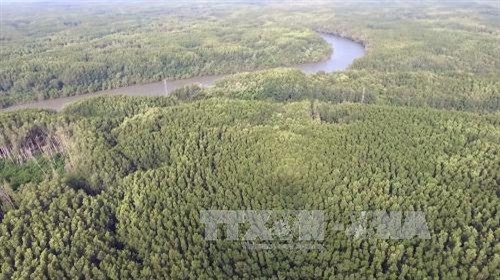 Society
Society

HCM City’s outlying Cần Giờ District has helped many poor and near-poor people rise above the poverty line in recent years through effective measures.
 |
| Mangrove forests in HCM City’s Cần Giờ District. The coastal district has taken several effective measures to help poor and near-poor households escape poverty in recent years. — VNA/VNS Photo Mạnh Linh |
HCM CITY — HCM City’s outlying Cần Giờ District has helped many poor and near-poor people rise above the poverty line in recent years through effective measures.
Nguyễn Thị Ngọc Dung of the district’s An Thới Đông Commune has managed to escape poverty since last year thanks to a preferential loan of VNĐ7 million (US$300) from the commune’s poverty reduction fund.
With the loan and her small savings, Dung bred cows and pigs. After earning some money from this, she bred shrimp and grew bananas and vegetables around shrimp ponds to earn additional incomes.
She said: “Previously, my family lacked money and so could not escape poverty. Thanks to the preferential loan and competent agencies helping us with farming techniques, my family has escaped poverty.”
Cần Giờ is the city’s only coastal district, and its average income last year of VNĐ43.78 million ($1,900) was lower than that of other outlying districts.
Last year, it provided preferential loans worth more than VNĐ200 billion ($8.8 million) to nearly 10,000 poor and near-poor households, according to its People’s Committee.
It also provided vocational training to nearly 1,770 workers and jobs to 3,600 poor people, and motorbikes, fishing tools, motor boats, industrial and family sewing machines to 54 poor households.
It built charity houses for 109 poor households and gifted health insurance cards to more than 27,700 poor and near-poor people.
As of the end of last year, the district had nearly 2,820 poor and 3,830 near-poor households, representing 15.4 per cent poverty and 20.9 per cent near poverty.
The district targets to reduce poverty and near poverty by 9.2 percentage points and 7.6 percentage points this year.
To sustainably reduce poverty, local authorities have encouraged farming households to use their unfertile rice fields to breed aquatic creatures and swifts for harvesting nests and high-value crops.
Cần Giờ has an area of more than 70,400ha, including a 33,000ha mangrove forest. But with the soil in more than half the places affected by alum and saltwater, the only aquaculture and tourism are possible and they are the district’s two key sectors.
The Cần Giờ mangrove forest is recognised by UNESCO as a world biosphere reserve.
The district People’s Committee has collaborated closely with the Fatherland Front Committee for a programme to reduce poverty in 2018-20. — VNS




